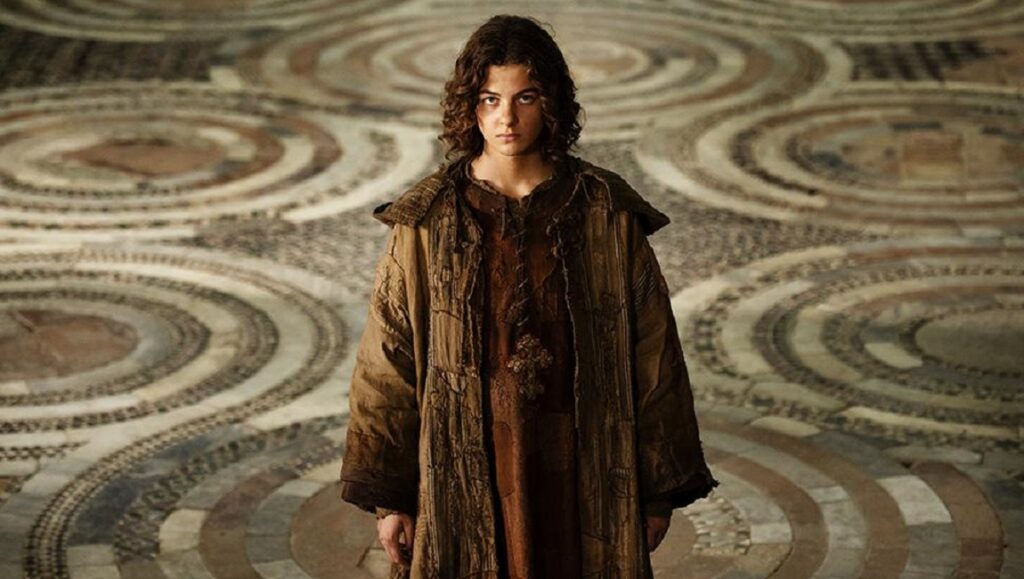After 2017’s Nico, 1988 and 2020’s Miss Marx, Italian writer-director Susanna Nicchiarelli brings her unofficial women-of-history trilogy to a close with Chiara. While the sophisticated portrait of the Velvet Underground collaborator, singer, and countercultural icon was widely acclaimed, Miss Marx had a harder time convincing the critics, its idiosyncratic blend of period drama restraint and punk rock abandon proving too uneven for many. Chiara operates in a similar register as the latter, displaying a penchant for eccentricity and shifting tones, as it chronicles the life of Saint Clare of Assisi (or Santa Chiara in Italian). Following her through crucial years of her life, the film sees her transform from a noblewoman, eager to leave her wealth behind for a life of religious devotion, to the founder of her own religious order, the Order of Poor Ladies, today known as the Order of Saint Clare.
Like her two previous films, Nicchiarelli’s latest biopic centers the struggle of her female main character, as she navigates life on her way to sainthood. Becoming an early follower and friend of Francis of Assisi (Andrea Carpenzano), Clare (Margherita Mazzucco) vows to live a life of obedience, chastity, and poverty, but is soon forced to contend with patriarchal interference, both literally, in the form of her father, and more broadly, in frequent conflicts with the über-conservative, deeply misogynistic Catholic Church. Even the mild-mannered and forward-thinking Francis, her closest male ally, reveals himself to be occasionally cavalier about the Church’s treatment of women, leading to discord in their friendship. In a pivotal scene, a senior member of the clergy, Cardinal Ugolino (Luigi Lo Cascio), bluntly lays things out for the devoted Franciscan, after she tries to get her own monastic guidelines approved. “Women are the origin of sin,” he reminds Clare. “It’s because of women that we all die.” Like Francis, she regularly finds herself at odds with the Church, although she often takes his pious rebellion even further, outright rejecting the Church’s rigorous hierarchies in favor of radical egalitarianism.
It’s in poverty, fasting, and tribulation that Clare finds herself closest to the female saints she would eventually join the ranks of, experiencing glimpses of the lives of figures like Scholastica and Mary. Encouraged by these visions, as well as ambiguous experiences that blur the line between divine intervention and her own ability to perform miracles, she soon sees her order grow, as “the talk of Rome” inspires other women with her devotion to Christ, and love for the sick and needy of the world. Chiara‘s moments of quiet religious revelation — a vase is miraculously filled with olive oil, for instance, prompting a friar to remind everyone that every meal is a miracle — have little in common with the tortured, Kierkegaardian reflections of Scorsese’s Silence, or the hallucinatory epiphanies of Paul Verhoeven’s erotic psychological drama Benedetta. Instead, Nicchiarelli grasps at the transcendent through her numerous exuberant musical numbers that see characters frolicking through the halls of their monastery and the vast fields that surround it, with one sequence in particular calling to mind a famous shot in Carl Theodor Dreyer’s religious drama Ordet.
As the years pass — Chiara begins in 1211 and periodically drops in on its eponymous character throughout the next 17 years — Nicchiarelli keeps introducing both somber moments of despair and scenes of uninhibited elation, but ultimately chooses to end things on a breezy, joyful note. When the former cardinal returns, now as Pope Gregory IX, his extravagant lifestyle is comedically contrasted with the virtuous modesty of the women’s order. After preparing a lavish feast for the ridiculously-dressed pope, whose unruly attire requires him to use a stepladder and several helpers to get on his horse, the women return to their monastic life, at first worrying about how to feed 50 mouths with only a small loaf of bread. But as the final song plays — this time a lively Europop number, as opposed to the Medieval music that has accompanied these interludes so far — we bear witness to the film’s final miracle, as the tiny bread somehow manages to feed every woman in the order. The scene is cheesy and the song is, frankly, shockingly terrible, but after seeing the often taxing spiritual journey Nicchiarelli has put the headstrong Clare through, it’s hard not to get wrapped up in its rapturous, wonderfully odd energy.
Published as part of Venice International Film Festival 2022 — Dispatch 2.


Comments are closed.